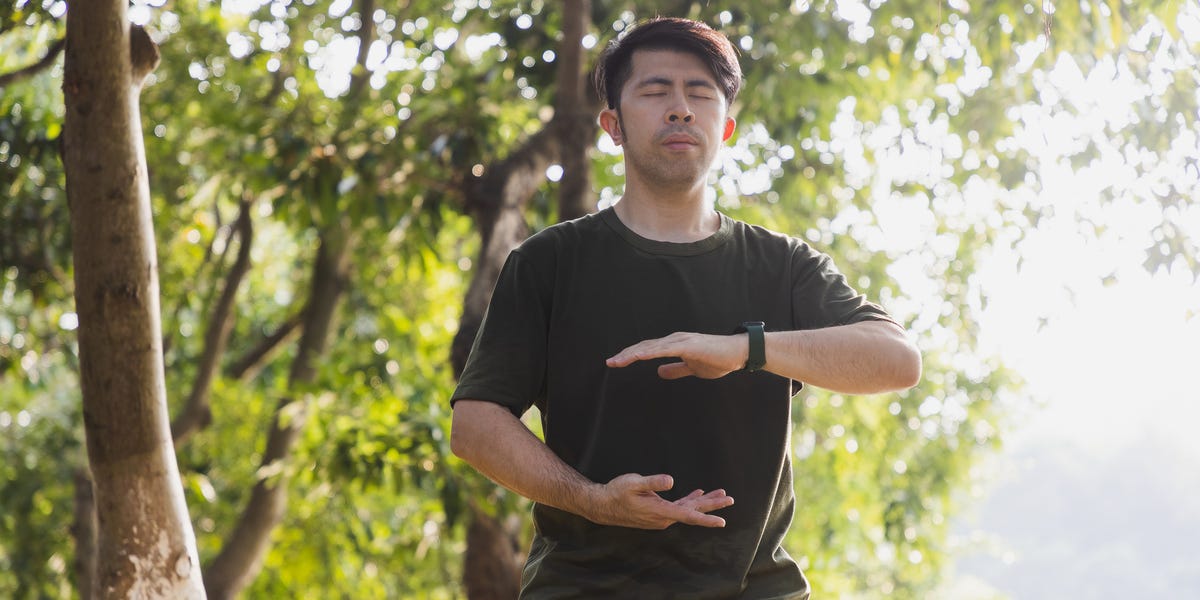Tai Chi has been practiced in China for more than 3,000 years, with the benefits of the slow, mindful, body-focused somatic workout widely purported. While the practice primarily helps with relaxation, a new study has now revealed that it has plenty of positive impacts physically, too.
The Study
In a study looking at the effects of Tai Chi on body composition and cardiorespiratory fitness in Chinese university students with obesity, researchers found the exercise can boost lean muscle and reduce waist size in just 12 weeks.
Studying 46 students, all of whom had a BMI of 28 or higher, researchers formed two separate groups. One performed Tai Chi three times a week, while the other group did simple stretching exercises with the same frequency and duration over the same period. Each participant had their body composition recorded at the start and end of the study, as well as waist circumference measurements and a formula-based estimate for VO2 max.
The Results
After 12 weeks of training, the Tai Chi group gained on average 0.87kg of lean mass. In direct comparison, the stretchers saw no meaningful gain in lean mass, highlighting how the ancient practice is able to strengthen muscles and ligaments through balancing and challenging flexibility.
The Tai Chi group also managed to lose an average of 3.38cm in their waist, but the stretching group intriguingly saw a larger reduction of 4.68cm. That’s not necessarily a direct result of the exercises, however, with calorie intake a key factor in weight loss – targeting weight loss around just the waist isn’t possible because there’s no such thing as spot reduction.
No discernible results were found regarding an impact on Vo2 max.
What Does This Mean for Us?
‘Based on the results, this study demonstrates that Tai Chi exercise is more effective than stretching exercises in improving the physical health of university students with obesity,’ the researchers concluded. ‘Specifically, Tai Chi exercise enhances lean body mass and reduces waist circumference, whereas stretching exercises only contribute to waist circumference reduction. Although Tai Chi exercise does not significantly impact VO2max, it remains a valuable physical activity for promoting overall health in this population.’
Related Stories
Ryan is a Senior Writer at Men’s Health UK with a passion for storytelling, health and fitness. Having graduated from Cardiff University in 2020, and later obtaining his NCTJ qualification, Ryan started his career as a Trainee News Writer for sports titles Golf Monthly, Cycling Weekly and Rugby World before progressing to Staff Writer and subsequently Senior Writer with football magazine FourFourTwo.
During his two-and-a-half years there he wrote news stories for the website and features for the magazine, while he also interviewed names such as Les Ferdinand, Ally McCoist, Jamie Redknapp and Antonio Rudiger, among many others. His standout memory, though, came when getting the opportunity to speak to then-Plymouth Argyle manager Steven Schumacher as the club won League One in 2023.
Having grown up a keen footballer and playing for his boyhood side until the age of 16, Ryan got the opportunity to represent Northern Ireland national futsal team eight times, scoring three goals against England, Scotland and Gibraltar. Now past his peak, Ryan prefers to mix weightlifting with running – he achieved a marathon PB of 3:31:49 at Manchester in April 2025, but credits the heat for failing to get below the coveted 3:30 mark…
You can follow Ryan on Instagram @ryan.dabbs or on X @ryandabbs_

